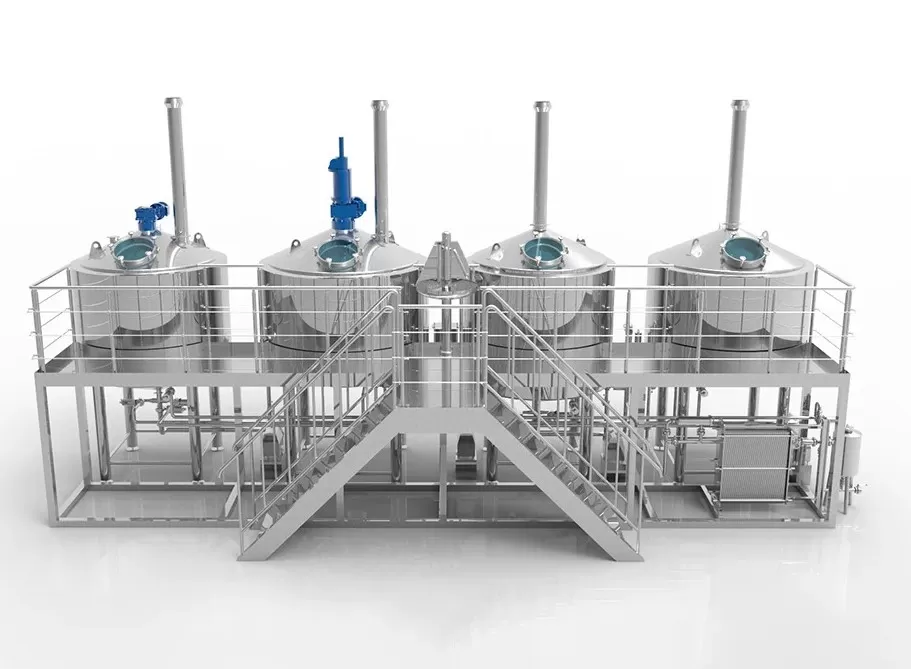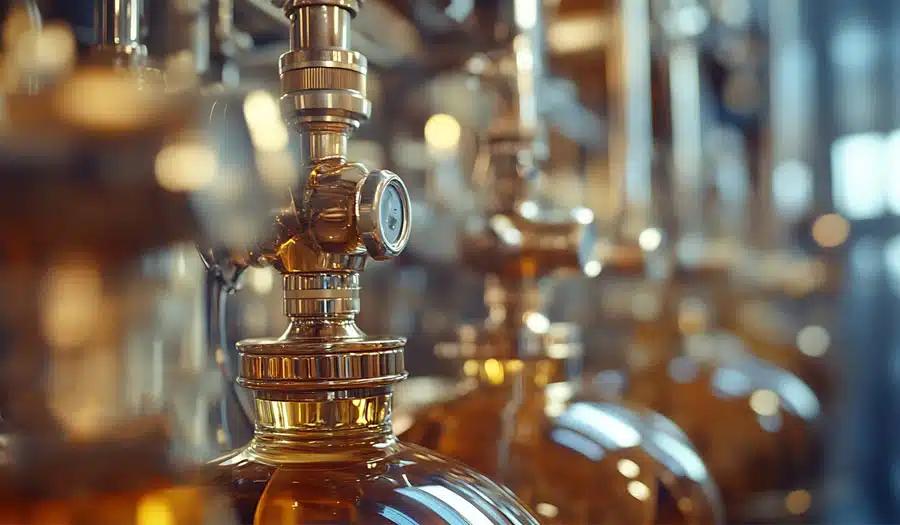What is an Alcohol Distiller?
An alcohol distiller is a tool that helps make strong drinks. It takes beer or wine and makes it into things like whiskey or vodka. This happens by heating and cooling the liquid in a special way.
People have been making alcohol this way for many years. The first stills were made hundreds of years ago. Now, we have better ways to do it.
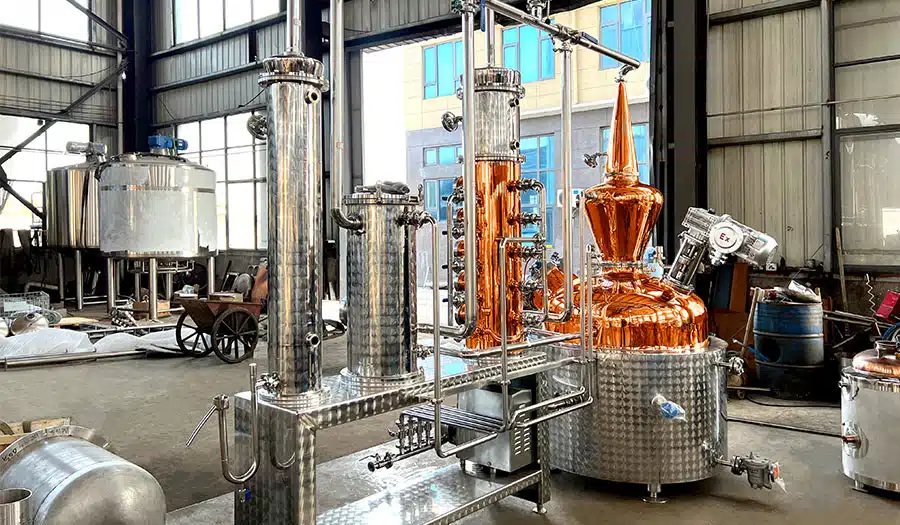
The Science Behind Distillation
Are you tired of trying to make high-quality spirits with poor equipment? Many home and craft distillers struggle with inconsistent results, wasting precious time and ingredients. Your hard work deserves better.
Think about what happens when your distillation runs go wrong. Batches that taste off. Money down the drain. Customers who don’t come back. This frustration can make you want to give up on your distilling dreams.
Fortunately, there’s a better way. Modern distillation equipment from industry leaders like Micet, with over 15 years of experience in brewing and distillation technology, can transform your process. Their integrated systems ensure perfect temperature control and consistent results every time, helping you create award-worthy spirits from day one.
How Distillation Works
- Fermentation – Yeast eats sugar and makes alcohol
- Heating – The alcohol gets hot and turns to vapor
- Condensation – Vapor cools and becomes liquid again
- Collection – The strong alcohol is saved
This process works because different liquids boil at different temperatures. Alcohol boils at 173°F (78°C) but water boils at 212°F (100°C).
Types of Distillation Systems
There are three main kinds of stills:
- Pot still – The old way, used for whiskey and rum
- Column still – More modern, makes vodka and neutral spirits
- Reflux still – Very clean spirits with less flavor
Each type has good points. Pot stills keep more flavor. Column stills make purer alcohol. Reflux stills make the purest alcohol.
Companies like Vendome Copper & Brass Works make some of the best stills. But many craft distillers are finding that distillery equipment from newer manufacturers offers better value with the same quality.
Types of Alcohol Distillers
Choosing the Right Distiller for Your Needs
Are you feeling lost in the sea of distiller options? With so many choices, finding the right equipment for your specific needs can be overwhelming. The wrong choice could mean wasted investment and subpar results.
Consider the frustration of purchasing a distiller that’s too small for your growing business, or too complex for your skill level. These mistakes can cost thousands and delay your distilling dreams.
What if you had an expert guide? Micet’s team brings 15 years of industry experience to help match you with the perfect distillation system. Their customized solutions ensure you get exactly what you need—whether you’re just starting out or scaling up your established operation.
Home vs. Commercial Distillers
| Feature | Home Distiller | Commercial Distiller |
|---|---|---|
| Size | Small (1-5 gallons) | Large (50+ gallons) |
| Price | $500-$3,000 | $10,000-$100,000+ |
| Permits | Personal use* | TTB permits required |
| Material | Often copper | Stainless steel/copper |
*Note: Home distilling is not legal in many places. Check your local laws.
Material Comparisons
Copper Stills:
- Helps remove sulfur compounds
- Gives a classic look
- Needs more cleaning
- Costs more
Stainless Steel:
- Lasts longer
- Easier to clean
- Less reactive
- Often cheaper
Many craft distillers find that a commercial distillery equipment setup with both copper and stainless components offers the perfect balance between tradition and practicality.
Product Roundup: Top Distillers
These are some of the best options:
- Traditional Pot Still – Good for whiskey and rum
- Modern Hybrid Still – Can make many types of spirits
- Automated Still – Easy to use with computer control
- Continuous Columns – For high-volume vodka production
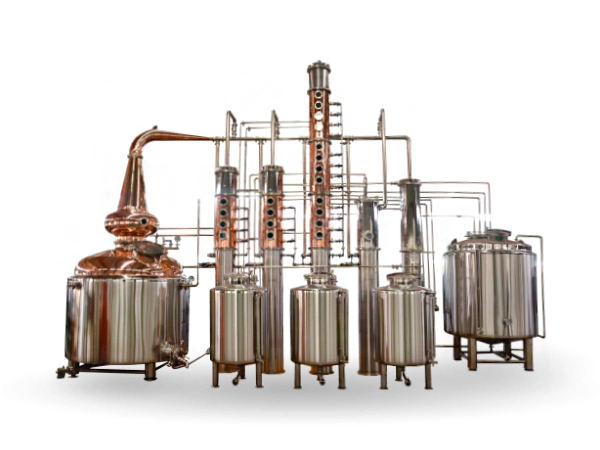
Factors to Consider When Buying
Key Features to Evaluate
Are you worried about making a costly mistake when buying distillation equipment? Many first-time buyers focus only on price, overlooking critical factors that affect the quality and safety of their spirits.
Imagine investing thousands in equipment only to discover it’s inefficient, hard to clean, or worse—unsafe. These problems can shut down your operation before it even starts.
The solution is working with experienced manufacturers who understand both the art and science of distillation. Micet’s engineering team, with their 22 years of process design experience, creates systems that optimize for both quality and safety, while their 3-year warranty on tanks provides peace of mind for your investment.
When looking at distillers, check these things:
- Batch size – How much can you make at once?
- Heating methods – Gas, electric, or steam
- Control systems – Manual or computer
- Cooling system – Water usage and efficiency
- Ease of cleaning – Can you reach all parts?
- Safety features – Pressure relief and fire prevention
The alcohol by volume (ABV) you want to make matters too. For vodka, you need a still that can reach high proof. For whiskey, flavor matters more than high proof.
Budget vs. Quality
You get what you pay for with distillers:
| Price Range | What to Expect |
|---|---|
| $500-$2,000 | Small, basic stills for learning |
| $5,000-$20,000 | Small craft distillery setup |
| $50,000-$100,000 | Professional small batch system |
| $250,000+ | Full commercial system |
For serious distillers, the return on investment comes from quality equipment. The global craft spirits market is set to reach $80.3 billion by 2027, growing at 25.7% per year. This makes good equipment worth the cost.
Key Statistics
Fire Safety
Step-by-Step Setup Guide
How to Use an Alcohol Distiller Safely
Are you nervous about the safety risks of distilling? You should be. Improper distillation setups can lead to dangerous situations—from fires to harmful chemicals in your final product.
Think about what’s at stake: your safety, your facility, and the health of everyone who tries your spirits. Without proper knowledge, you’re taking a gamble that could have serious consequences.
Here’s where professional guidance makes all the difference. With Micet’s 15 years of experience and dedicated service centers in countries like France, Australia, and Canada, you gain access to expert knowledge that ensures your distillation process is both safe and compliant. Their team of skilled professionals can help you implement proper ventilation, temperature controls, and safety protocols—turning a potentially dangerous process into a secure, reliable operation.
Safety First
- Always have good air flow – Alcohol vapors can catch fire
- Use a water source – For cooling and in case of fire
- Never leave a running still – Stay and watch it
- Keep flames away – Use electric heat if possible
- Know your cuts – The first liquid (heads) can be toxic
Getting Legal
The TTB (Alcohol and Tobacco Tax and Trade Bureau) controls distilling in the USA. You need permits before you start. This takes time and money.
A basic permit costs $1,000-$5,000 per year. You also pay $13.50 per proof gallon in tax.
Local distilling ordinances vary a lot. Some places don’t allow distilling at all. Others have special zones where it’s OK.
The American Distilling Institute and DISCUS (Distilled Spirits Council of the United States) have good information to help you stay legal.
Legal and Safety Considerations
Navigating Alcohol Distillation Laws
Are you confused by the complex web of distillation regulations? Many aspiring distillers give up before they start because the legal requirements seem too daunting. One wrong move could result in hefty fines or even criminal charges.
Consider the stress of investing in equipment only to discover you can’t legally operate it in your location. Or worse—facing penalties because you missed a crucial permit or tax payment.
This is where expert guidance becomes invaluable. Micet’s 15 years of industry experience includes helping over 1000 breweries and distilleries navigate regulatory requirements across 86 countries. Their team understands the nuances of alcohol permits, excise taxes, and craft spirits certification—turning a complicated legal process into a manageable roadmap for your distilling success.
Federal Rules
The federal government is strict about making alcohol. The rules come from:
- TTB – Handles permits and taxes
- FDA – Makes sure it’s safe to drink
- EPA – Watches waste from making alcohol
State and Local Rules
States have different rules. Some make it very hard to get a license. Others want to help small makers.
City rules matter too. You need to check:
- Zoning laws
- Fire codes
- Building permits
- Waste water rules
Many distillers work with the alcohol distiller suppliers who can help with legal compliance as part of their service package.
Maintenance and Troubleshooting
Extending Your Distiller’s Lifespan
Are you worried about the lifespan of your expensive distillation equipment? Many distillers face premature equipment failure due to poor maintenance practices, leading to costly repairs and production downtime.
The frustration of a broken still during peak production can be devastating. Not only do you lose valuable production time, but repairs can cost thousands and take weeks to complete.
The answer is preventative maintenance and support you can count on. Micet’s comprehensive after-sales support, available through 12 service centers worldwide, ensures you’re never alone when issues arise. Their 3-year warranty on tanks and 1-year warranty on auxiliaries means you can distill with confidence, knowing expert help is just a call away when you need it.
Cleaning Tips
Keep your still clean for better alcohol and longer life:
- Clean after each use – Don’t let residue dry
- Use citric acid – For copper stills to remove tarnish
- Check all seals – Replace if worn or damaged
- Inspect condensers – Clean out any mineral build-up
- Polish copper – Helps with congener removal
Common Problems and Fixes
| Problem | Possible Cause | Solution |
|---|---|---|
| Low proof | Condenser too warm | Add more cooling water |
| Off flavors | Alcohol contamination | Better cleaning, replace seals |
| Leaks | Loose fittings | Tighten or replace gaskets |
| Heating issues | Element failure | Check electrical connections |
A mid-sized craft distillery can expect about 67% return on investment over three years with proper maintenance. This shows how important good care is.
Alcohol Distiller FAQs
Common Questions
Are you hesitant to invest in distillation equipment because there’s so much conflicting information? Many beginners struggle with unanswered questions that prevent them from taking the next step in their distilling journey.
The uncertainty can be paralyzing. Without clear answers from trusted sources, how can you confidently move forward with what might be a significant investment?
Let trusted experts clear up the confusion. With over 1000 successful brewery and distillery installations in 86 countries, Micet’s team has encountered virtually every scenario and question. Their service team brings 22 years of process design experience to address your specific concerns—turning uncertainty into confident decision-making.
“Can I legally distill alcohol at home?”
In most of the USA, the answer is no. Making alcohol to drink without permits is against federal law. Some states allow small amounts for fuel, but not for drinking.
“What’s the difference between vodka and whiskey distillation?”
Vodka needs very clean alcohol. It uses column stills to get high proof (95%+ alcohol).
Whiskey keeps more flavor. It uses pot stills and lower proof (60-80% alcohol). Then it ages in wood barrels.
“How much does a professional-grade distiller cost?”
A small professional setup starts around $50,000. A complete craft distillery with all equipment can cost $250,000 to $500,000.
“What materials are best for stills?”
Copper has been used for centuries because it removes sulfur compounds. Stainless steel lasts longer and is easier to clean. Many stills use both materials.
“How much space do I need?”
A small craft distillery needs at least 1,000 square feet. This includes space for the still, fermenters, storage, and bottling.
Top Alcohol Distillers of 2025
Are you struggling to keep up with changing consumer tastes and increasing competition in the spirits market? Many distillers find themselves falling behind because their outdated equipment can’t deliver the consistency or quality modern consumers demand.
As craft spirits continue to grow at 25.7% annually, distillers with inferior equipment risk losing market share and customer loyalty to those with more sophisticated production capabilities.
The solution is partnering with a forward-thinking equipment manufacturer that understands both tradition and innovation. Micet’s R&D team continuously develops new solutions that combine time-honored distillation principles with modern efficiency and control. Their customized approach ensures your distillery can produce the unique, high-quality spirits that will set you apart in an increasingly crowded market.
Comparison Table: Professional Distillers
| Model Type | Price Range | Capacity | Best For | Key Feature |
|---|---|---|---|---|
| Pot Still System | $50K-$120K | 100-500L | Whiskey, rum | Traditional flavors |
| Hybrid Still | $85K-$200K | 200-1000L | Multi-spirit | Versatility |
| Column System | $150K-$300K+ | 500L+ | Vodka, gin | High proof, efficiency |
| Complete Turnkey | $250K-$1M+ | Custom | Full distillery | All-in-one solution |
The right choice depends on what spirits you want to make and how much.
Companies like Buffalo Trace Distillery and Copper & Kings Distillery use custom equipment that fits their exact needs. Many new distillers are finding that working with experienced manufacturers who understand the complete process gives better results.
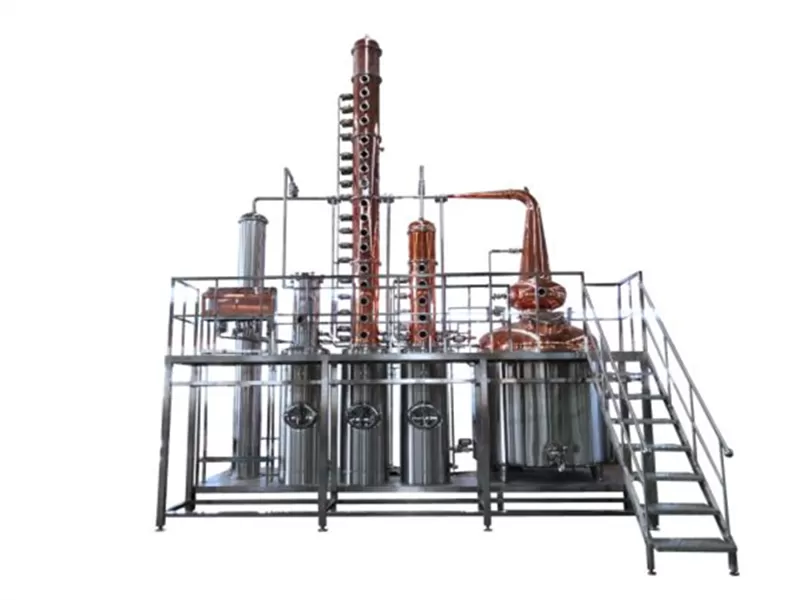
Environmental Impact
Are you concerned about the environmental footprint of your distillery operation? Many distillers face increasing scrutiny from consumers and regulators about waste production and resource consumption.
The reality is sobering: distilleries without proper environmental controls can produce 5-10% of their raw materials as organic waste, with significant water usage and emissions that may violate local regulations.
Here’s how innovative equipment design makes a difference. Micet’s engineering team integrates sustainable solutions into their distillery systems—from water recycling to efficient energy usage—reducing both environmental impact and operational costs. Their systems achieve a human toxicity impact score of just 0.85/kg (normalized), lower than the industry average, helping you meet sustainability goals while maintaining profitability.
Environmental Impact Scores
- Craft distillery: 0.85/kg
- Large-scale brewery: 1.2/kg
- Winery: 0.6/kg
Waste Management
Good distilleries plan for waste:
- Spent grain – Can be animal feed
- Cooling water – Can be recycled
- Cleaning chemicals – Must be properly disposed
Getting Started with Your Distillery
First Steps to Success
Are you dreaming of starting your own distillery but feeling overwhelmed by all the moving parts? Many aspiring distillers delay their plans for years because they don’t know where to begin or how to coordinate all the necessary elements.
The complexity can be paralyzing—from equipment selection to facility design, regulatory compliance to production planning. One misstep could cost thousands in wasted resources or delays.
What if you had a partner to guide you through the entire process? Micet’s turnkey solutions approach has helped establish over 1000 successful breweries and distilleries across 86 countries. Their team, led by CEO Nancy with 15 years of international experience, offers comprehensive support from initial concept through equipment installation and beyond—turning your distillery dream into a profitable reality.
Planning Your Distillery
- Make a business plan – Know your costs and sales goals
- Choose your spirits – What will you make?
- Find a location – Check zoning laws
- Apply for permits – Start early, this takes time
- Design your space – Work with experts who know distilling



